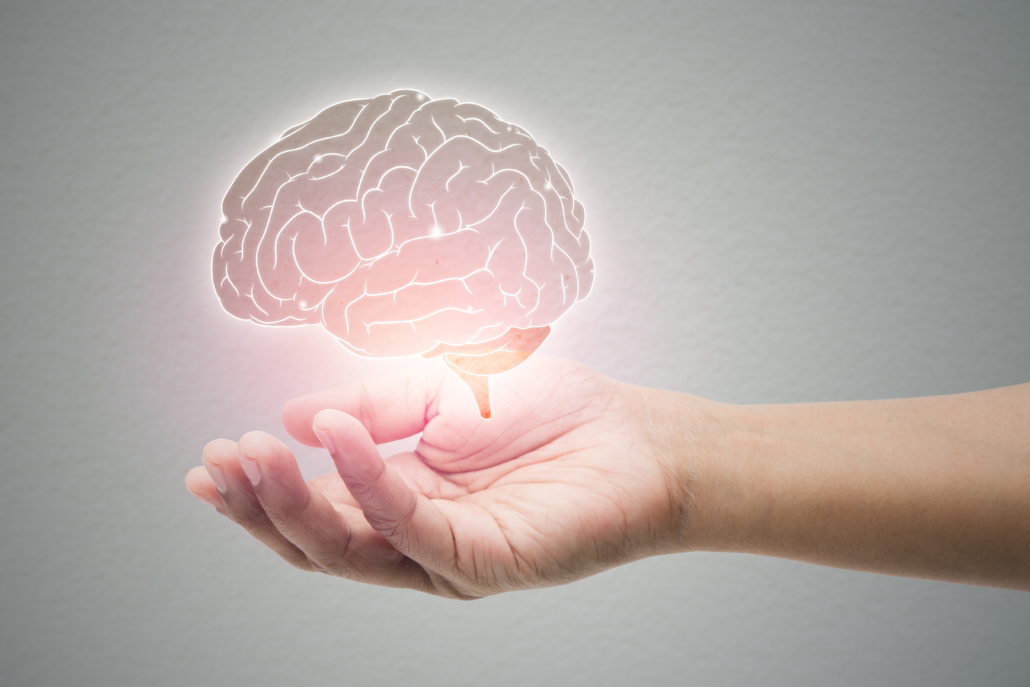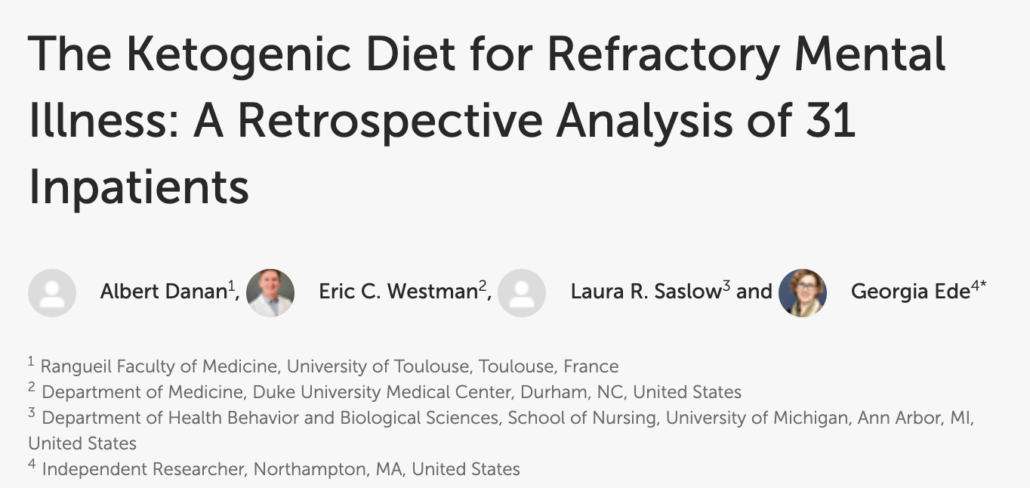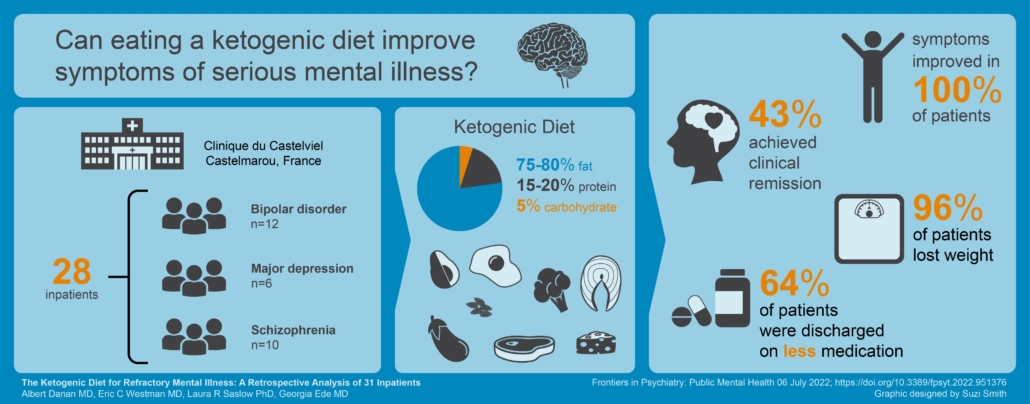
The ketogenic diet has been used to treat drug-resistant epilepsy for over 100 years. The effectiveness of keto for treating neurological disorders has led dieters and researchers alike to explore the effectiveness of a ketogenic diet for other psychiatric and mood disorders linked to brain function.
In this article, we’ll explore the science supporting the use of a ketogenic diet for bipolar disorder and other mental health issues.
The ketogenic diet is defined as eliminating nearly all carbohydrates, getting most of your calories from fat and the remainder from protein.
Standard ketogenic macronutrient ratios break down to
Cutting carbs triggers the liver to metabolize fat stored on the body and fats from food into energy compounds called ketones. These compounds are a superior energy source per unit. And they can enhance mental function when fueling your brain cells. [1]
Glucose (Carb) Energy 3-Hydroxybutyrate Ketone (Fat) 8.7 kg of ATP per 100g10.5 kg ATP per 100g
Ketosis is a natural and sustainable metabolic state for humans. In fact, it’s part of our evolutionary heritage.
Numerous lines of evidence suggest that humans evolved as hypercarnivorous apex predators for nearly 2.5 million years until the dawn of agriculture only 10,000 years ago.1
During this vast period of evolution, our ancestors hunted and scavenged meat from large fatty animals known as “megafauna” and had only seasonal access to raw, low-carb plants and fruits.
Modern humans are nearly genetically identical to our carnivorous, ketogenic, paleolithic ancestors. It follows that our bodies, including our brains–the most energy-hungry organ in our bodies–can benefit from a simulated return to our ancestral eating patterns.

Numerous studies have found that a ketogenic diet can be beneficial for various brain conditions. [2]
The most researched use of the ketogenic diet is for the treatment of epileptic seizures in children, especially those for whom drugs are ineffective. [3]
Other studies have found that keto can protect against neurodegenerative diseases, including Alzheimer’s and Parkinson’s. [4]
Psychiatric researchers have pointed out that the same medicines used to treat people with epilepsy are used to treat bipolar disorder. For this reason, the ketogenic diet has begun to be studied for its effects on bipolar and other psychiatric disorders.
Bipolar is a psychiatric mood disorder associated with mood swings from depressive lows to manic highs. [5] [6]
It is estimated that across the world, 85 million people suffer from serious bipolar mood disorders and psychotic illnesses. [7] Almost 50% of people that are treated for bipolar disorders continue suffering from episodes. [8]
While at least 280 million people suffer from various depressive disorders worldwide. [9]

Though research on the ketogenic diet for bipolar and other psychiatric disorders is still emerging, the preliminary results show significant benefits.
A small 2013 study followed two women who used the ketogenic diet for the treatment of type-2 bipolar disorder. [10]
One woman maintained keto for two years, and the other woman for three years. For both women, the ketogenic diet led to greater mood improvements than medications. And neither woman experienced negative side effects.
A 2019 study analyzed online reports on the role of a ketogenic diet in mood stabilization. While acknowledging the limits of self-reported data, researchers concluded that the ketogenic diet is effective.
They point out that the benefits of keto for bipolar are likely because keto provides superior fuel to the brain, helping to mitigate mitochondrial dysfunction– a component of bipolar disorder and other psychiatric and neurodegenerative conditions. [11]
While other research suggests that the benefits may also have to do with how keto reduces sodium inside of brain cells. Mood-stabilizing drugs like lithium have a similar effect.


A groundbreaking 2022 controlled feeding study of 31 psychiatric inpatients found remarkable results. [12]

One of the researchers on the above study, Dr. Georgia Ede has experimented with low-carb high-fat diets for over a decade. In 2018, she personally eliminated all plant foods and now eats a carnivore diet.
Below you can watch Dr. Ede speak with Dr. Ken Berry about the benefits of keto for mental health.
A 2020 study conducted by researchers at Harvard University polled over 2,000 people who practiced a keto-carnivore diet for at least 6 months.
They discovered that 96% of participants improved or resolved psychiatric symptoms. [13]

An all-meat version of the keto diet called the carnivore or keto-carnivore diet, has been used by high-profile adopters to treat mood disorders.
Mikhaila Peterson, daughter of popular psychologist Jordan Peterson, discovered the carnivore diet when listening to Dr. Shawn Baker introduce it to Joe Rogan on his popular podcast.
Mikhaila has since shared that going carnivore lead to her recovery from bipolar disorder, hypersomnia, juvenile arthritis, psoriasis, and Lyme disease.
You can watch Mikhaila speak about her recovery below.
Jordan Peterson was inspired by his daughter and went carnivore to treat his own chronic depression. Peterson practiced the “Lion Diet.” This carnivore elimination diet entails eating only red meat, salt, and water for at least a month.
You can watch Peterson speak with Rogan about how carnivore resolved his anxiety and depression.
Amber O’Hearn, one of the most rigorous writers about the carnivore diet has credited it with resolving her bipolar depression and suicidal ideation.
The studies and personal accounts of using the ketogenic diet to treat bipolar and other psychiatric disorders are compelling. But there are a few areas of caution to keep in mind.
The ketogenic diet has been successfully used to treat drug-resistant epilepsy for over 100 years.
The same mechanisms that make keto effective against epilepsy suggest that it can be therapeutic for bipolar and other psychiatric disorders.
Though more research needs to be done, preliminary studies show unprecedented positive outcomes when using the ketogenic diet to treat bipolar and other mood disorders.



We’re a global community of seekers, healers, and doers committed to reclaiming health on our own terms. When you join the Kiltz Mighty Tribe (KMT), you’ll gain access to education, support, and collective wisdom.


